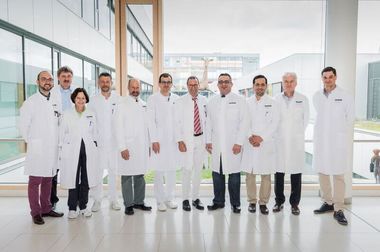New surgery Europe-wide: spina bifida successfully operated within the womb

August 2016
The operative approach within the womb at Heidelberg University Hospital, unique in Europe, can markedly reduce severe spinal cord damage.
With an operative approach unique in Europe, an interdisciplinary team of perinatologists and neurosurgeons at Heidelberg University Hospital operated on the open spine (Spina bifida) of an unborn baby in the womb. The baby was able to develop another eleven weeks in his mother's belly before being born by Caesarian on August 9. "For the surgery during the pregnancy, we opened the uterus similarly to a Caesarian. With much care, the child was partially taken out, keeping the umbilical cord attached", explained Professor Dr. Christof Sohn, Medical Director of the Department of Obstetrics and Gynecology at Heidelberg University Hospital. "During the operation, the spinal cord, dura matter, and skin were closed layer by layer. Thus, we were able to give this baby the best possible start in life: the risk for hydrocephalus was reduced and severe damage to the spinal cord could be largely prevented", says Professor Dr. Andreas Unterberg, Executive Director of the Department of Neurosurgery at Heidelberg University Hospital. The severe changes to the child‘s brain evident on pre-surgical ultrasound resolved during the pregnancy. "This is a huge success, that was only possible with intensive interdisciplinary cooperation", says Professor Sohn.
When children with spina bifida aren’t treated until after birth, the amniotic fluid irreparably damages the unprotected spinal cord. "Studies from the USA have shown impressive evidence of the great advantages offered by open fetal surgery for spina bifida", says the pediatric neurosurgeon Privatdozentin Dr. Heidi Bächli, who operated on the baby’s spine. "The babies seldom suffer hydrocephalus, the cerebellum shifts less into the spinal canal, and the extent of paralysis can be greatly reduced." The Heidelberg team cooperates with one of the largest fetal surgical centers in the world, the St. Louis Fetal Care Institute in the USA, which has been performing this procedure successfully for a few years. The interdisciplinary Heidelberg team of gynecologists, neurosurgeons, anesthesiologists, and neonatologists acquired expertise for this in St. Louis, and colleagues from the USA stood by in an advisory capacity for this first procedure.
The defect known as "spina bifida aperta" (open spina bifida) develops during the 20th and 28th days of pregnancy, if the vertebral body and often the skin overlying the spinal cord do not close. Depending on the magnitude and the position of the defect, affected children are later greatly limited in their motor skills and often develop hydrocephalus, where cerebrospinal fluid accumulates within the skull. One severe and common form of spina bifida, which afflicted the child in Heidelberg undergoing surgery, is meningomyelocele. Here, spinal cord tissue combined with nerve fibers presses through a gap in the spine, forming an exterior pouch. For the child undergoing this surgery in Heidelberg, this pouch was over 3.5 cm in length over the lumbar spine. Because of the pressure changes in the open spinal cord, a portion of the cerebellum was displaced into the spinal canal.
Interdisciplinary Consulting at Heidelberg University Hospital
Prior to the procedure, Gynecologists, Neonatologists, Pediatric Neurosurgeons, and Anesthesiologists consulted thoroughly and candidly. During the operation itself, each step was performed by the appropriate experts, and the surgery to the spinal cord was performed exclusively by experienced pediatric neurosurgeons. For follow up care, further disciplines such as pediatric neurology, pediatric neurosurgery, urology and nephrology, orthopedics, pediatric general surgery, nursing, physical therapy, and social work will continue to cooperate and monitor the child's development in the coming years, so that necessary therapy and support can be initiated at an early stage.
Further Information:
Video (German)
Perinatal Center

